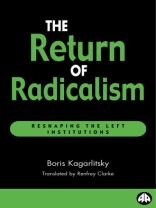The rise of neo-liberalism has had a devastating impact on the institutions and organisations with which the left has traditionally been associated. Boris Kagarlitsky examines this crisis and explores areas of opportunity for the left.
He begins by focusing on the decline of trade unions in the West and the attempts to revive them, contrasting this with the rapid growth of unions in the nations of the developing world and the new industrial countries. He argues that trade unionism has a vital role to play in the twenty-first century.
Kagarlitsky then provides a critique of the post-modernist left, arguing that the experiences of Eastern Europe and of the Third World demonstrate the vital need for a universal left as the only viable alternative to the emerging 'new barbarism’.
The state of the contemporary left is explored, with an assessment of the contributions of the 'third left’ and 'third socialism’ and the new wave of left parties and movements, such as the German Party of Democratic Socialism, the Workers’ Party in Brazil, and the Zapatistas in Mexico.
Spis treści
Preface
Introduction
1. Does Trade Unionism have a Future?
2. Beyond Identities
3. The Third Left or the Third Socialism
Notes
Index
Introduction: Pride and Protest
1. Does trade unionism have a future?
The crisis of unionism
The post-Soviet trade unions
South Korean activism
South African militancy
Third World workers form fighting unions
New social unionism in Europe
Changing the concept of unionism
2. Beyond Identities
Changing fashions
Identity politics
Discoursive struggles
Feminism: from protest to career politics
Individualist mass movements
Moving East
The real differences
The Marxist approach
Hegemony and postmodernist strategy
Universalism and democracy
Affirmative action
From defensive struggles to corporatism
Leftist strategies
Non-governmental organizations
Class politics comes back
3. The Third Left or the Third Socialism
'The third left’
The third socialism
The Zapatistas
Return to the arms
Protests and programs
Rifondazione in Italy
Party of Democratic Socialism in Germany
The Workers Party in Brazil
Struggles in Eastern Europe
Pluralist left
Between resistance and 'constructive work’
From networking to challenging the system
Conclusion: The Stage we are in
O autorze
Boris Kagarlitsky is a senior research fellow in the Institute for Comparative Political Studies, the Russian Academy of Sciences. He was a political prisoner under Brezhnev and latterly has been an adviser to the Chair of the Federation of Independent Trade Unions of Russia. He is the author of Russia Under Yeltsin and Putin (Pluto, 2002), The Politics of Empire (Pluto, 2004) and Empire of the Periphery (Pluto, 2007).












